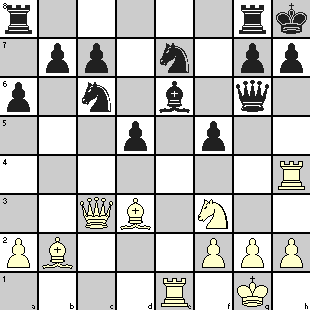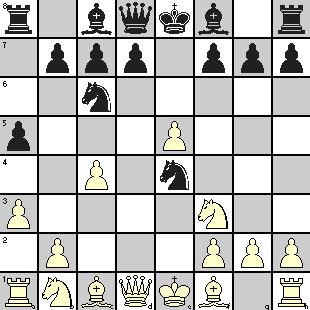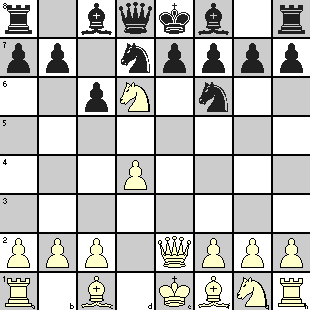You have mostly seen the theme of Philidor’s position in action in our discussions on smothered mate, but we pointed out that such mate can occur during the opening phases also with the King in the center when that player handles his pieces badly or deviates from established lines without sufficient thoughts behind such moves.
First we show one more example of how the lines can be cleared to create Philidor’s position for the final Knight check.

Here the Black King has already closeted himself and all White needs is to deliver a Knight check from f7, but the Bishop and the Queen are standing in the way. So White finds the move to kill two birds with one stone!
| 1. | Rxe6! | Qxe6 | White could also win after this with 2. Rxh7+ Kxh7 3. Ng5+ to capture the Queen … |
|
| 2. | Ng5 | Qg6 | … but he wanted a more direct route and planned to force the Queen away to guard against 3. Rxh7# |
|
| 3. | Rxh7+ | Qxh7 | The hapless Queen now smothers the King! | |
| 4. | Nf7# |
You have seen enough to be able to identify such positions and exploit those to add to the repository of such examples! Now we show how inaccurate play can lead to smothered mate quite early in the game. In the following game with Black playing Budapest Gambit (Fajarowicz Variation), White mixed up his opening lines and went astray. The result is a short game with Black delivering a smothered mate with almost a full board!
This is how it happened.
| 1. | d4 | Nf6 | ||
| 2. | c4 | e5 | ||
| 3. | dxe5 | Ne4 | ||
| 4. | a3 | Nc6 | ||
| 5. | Nf3 | a5 |

| 6. | Nbd2 | Nc5 | White needed to play 6. Qc2 | |
| 7. | b3 | Qe7 | ||
| 8. | Bb2 | d6 | ||
| 9. | exd6? | Nd3# |
If you think that White played badly, what will you say about the way the four allies played against Alekhine at Palma in 1935? It is something similar to above example with colors reversed.
| 1. | e4 | c6 | ||
| 2. | d4 | d5 | ||
| 3. | Nc3 | dxe4 | ||
| 4. | Nxe4 | Nd7 | ||
| 5. | Qe2 | Ngf6? | ||
| 6. | Nd6# |
The final position:

Considering that four players were consulting to choose their move, it is unbelievable, isn’t it? Or is it a case of too many cooks…?
Note: These positions were taken from a book by Chernev & Reinfeld.

